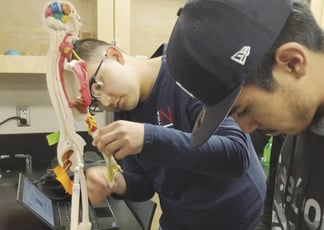Students who discover their passion for nursing during or before high school gain an edge in college and career. As communities work to fill much-needed roles in healthcare and medicine, students in Project Lead The Way (PLTW) classes are building the knowledge and skills to become the next generation of nurses. Learn about the professions and pathways of two individuals whose high school experiences in PLTW Biomedical Science significantly contributed to their passion for nursing and successful careers.
Amanda Pugh, RN BSN
ICU Trauma Nurse at R Adams Cowley Shock Trauma Center
Baltimore, MD
What's something unique or interesting about the work you do?
No day is the same. I see patients who have experienced gunshots, falls, work injuries, car and motorcycle accidents, and soft tissue infections. I learn new things every shift and am constantly challenged and stimulated by my work.
How did your PLTW classes prepare you for life after high school?
Taking PLTW in high school prepared me for college labs and reports. I had a foundation of anatomy from PLTW that came in handy in my college anatomy courses. Being able to perform dissections in high school with PLTW was very valuable to me as a hands-on learner.
What’s something you learned in PLTW that you still use today?
Something from PLTW that I still use today is the concept of working with others in different medical careers to form a multi-disciplinary team around each patient to help best treat them. Learning about related career fields and working with classmates with different areas of interest gave me a better idea of how many people create the patient's experience. Hospital care is so much more than only doctors and nurses, and PLTW encouraged researching the related career fields such as nutrition, pharmacy, forensics, pathology, among much more.
What’s something people might not know about nursing?
What people might not know about nursing is how involved nurses are. We administer medications and perform assessments, but we are advocates for our patients, especially on units like mine where patients often can't speak for themselves. The field of nursing is so diverse. Nurses can hold newborn babies and can hold the hands of patients who are dying—and are also present at every stage in between!
What’s an innovation in nursing you’re excited about?
A new innovation I'm seeing more in nursing is technological equipment (EKG machines, neurologic stimulators) connecting to the Electronic Health Record and results are automatically transferred into the patient's digital chart. With our world growing more technology-focused, it is pivotal to integrate new tech into healthcare safely to improve jobs and patient outcomes.
Amanda is a graduate of Mercy High School in Baltimore, MD, where she completed the PLTW Biomedical Science pathway.
Kiersten Smith, BSN RN, CPTC, LSSBB
Organ Procurement Coordinator at Lifesharing
San Diego, CA
What's something unique or interesting about the work you do?
I have been fortunate enough to work for Lifesharing, San Diego and Imperial County’s Organ Procurement Organization, for the past four years. As an organ procurement coordinator (OPC), I directly manage a donor’s care after brain death, optimize their organs for transplant, and work closely with transplant centers to match those organs to recipients who are waiting for a life-saving gift. This role is incredibly unique due to the level of autonomy I have in making critical, real-time decisions that require a balance of clinical expertise and rapid decision-making. I serve as the vital link between a donor’s passing and their organs providing another person with a second chance.
What’s one of the ways nurses impact the world?
Nurses in my role impact the world by guiding families through healing after the loss of a loved one. During the organ donation process, nurses (and OPCs) offer compassionate support in moments of deep grief, helping families find comfort in knowing their loved one’s gift will save and transform lives. Through their care and advocacy, nurses turn loss into lasting impact, ensuring every donor’s legacy lives on.
What's something you learned or did in a PLTW class that taught you something you use in your job today? PLTW taught me the importance of problem solving—a skill I use daily in my job. In organ donation, I often face tough situations where the straightforward answer isn’t enough. PLTW helped me understand the importance of finding creative solutions, thinking outside the box, and using strategic planning to navigate complex challenges. PLTW truly sparked my love for healthcare and my desire to help people, giving me real-life experiences that made me confident in pursuing this career.
How can educators bring more awareness to students about what nurses do and/or how to become one?
I feel like when most people think of nursing, they immediately picture working bedside in the emergency room (ER), post-anesthesia care unit (PACU), operating room (OR), or labor and delivery…but the field is so much bigger than that. I started my career in the intensive care unit (ICU), and after two years I realized a patient-facing role wasn’t the right fit for me. At the time, it felt discouraging, but it also pushed me to explore the other incredible and “unusual” opportunities within the field of nursing.
Students could become an OPC, work in aesthetics and cosmetic procedures, be a flight nurse, dive into research, pursue legal nursing, lead public health initiatives, or even work with healthcare technology. There are so many paths to take, and learning about the wide range of options could help students see how nursing can fit so many different passions and goals.
Kiersten Smith is a graduate of Warsaw Community High School in Warsaw, IN, where she completed the PLTW Biomedical Science pathway.
Celebrate nursing with us! Check out this webpage to find classroom activities that explore pathways and professions in nursing.

.jpg?width=238&height=297&name=Kiersten%20headshot%20(1).jpg)

